“To sow the fields. To build bridges. To light the stars. To fight the darkness…” With this prayer in my heart, I left a lecture by military chaplain Andriy Zelinsky in Dnipro, a city struck by nighttime missile attacks that kill and destroy. This assault is not the first, and tragically, it won’t be the last for Ukraine. A day of mourning for Dnipro’s victims has overlapped with Ukraine’s Day of Language and Writing—a fitting day to pen this reflection.
Before that night’s shelling, I believed that Ukraine’s fight for freedom could only be waged on the hardest frontlines—in trenches, with weapons, and with sheer force countering Russia’s aggression. That is indeed where much of this war unfolds. If the Armed Forces, law enforcement, and volunteers don’t hold the line, we’ll have no future. Or, we’ll survive only as shadows of ourselves, speaking Russian, perhaps forgetting who the Heroes of Kruty were or losing touch with the legacies of Lesya Ukrainka, Podmohylnyi, Zabuzhko, Karpa, and Zhadan.
Now I see that our identity isn’t just a present concern. If we live to see our Victory, we’ll also face choices about our language. That requires education, self-education, and an understanding of our history and culture, deeply rooted in our past and our people.
Andriy Zelinsky, a military chaplain, writer, educator, and member of the Society of Jesus. He is also a political scientist, public figure, co-founder, lecturer, and a member of the Initiative Group and Supervisory Board of the Ukrainian Leadership Academy:
“We have two fronts. One is on the battlefield, and the other is in educational institutions. These are two crucial areas where the fate of the nation and the country is determined. Education is a tool that enables a meaningful connection with reality… The core purpose of education is to shape a Ukrainian who is free and dignified, aware of their freedom and dignity, so that, by developing their own potential, they can serve their community and country, becoming a person capable of contributing to the future.”
The language issue in Ukraine has long been fraught and complex. For centuries, the Ukrainian language has endured relentless pressure from empires aiming to suppress it. Starting in the 18th century, the Russian Empire launched a systematic campaign to eliminate the Ukrainian language, enacting a series of restrictive decrees and laws. The 1863 Valiuyev Circular and the 1876 Ems Ukaz, for instance, banned the printing of Ukrainian texts and imposed strict limitations on the use of the Ukrainian language in education and literature.
Under Soviet rule, the situation hardly improved. Despite a brief period of Ukrainisation in the 1920s, Ukrainian was once again pushed out of the public sphere by the 1930s, with Russian language taking precedence. Soviet authorities wielded language policy as a means of control and assimilation, attempting to dissolve Ukrainian identity into that of a “single Soviet people.”
After Ukraine gained independence in 1991, language remained a key pillar of Ukrainian identity. Yet, lingering Soviet legacies and the pervasive influence of Russian-language media in film and music meant that many Ukrainians continued using Russian in daily life, often without questioning its origins or implications.
Liana Khobot, a volunteer and originator of the well-known phrase within Dnipro’s volunteer community, “So that it would be morning, so that it would be day or night,” shares her experience:
“I worked as a secretary for as long as I can remember. I learned Ukrainian in school, but I rarely used it in daily life—not because I avoided it, but simply as a result of my Soviet upbringing. Since 2014, when speaking with relatives of friends, I have often been asked why I didn’t speak Ukrainian. I avoided answering but kept questioning myself. Even when new orders came through to start using the language in official documents, my day-to-day life remained mostly Russian. I can’t even explain why.
Everything changed on 24 February 2022. I woke up, like everyone else, to the sound of explosions. What we couldn’t believe—or didn’t want to believe—had happened. When my friend called at 5:00 a.m. to suggest leaving, I switched to Ukrainian right away. Even if it was broken or mixed with Russian, I spoke in my native language. My friend and my mother, who came from a village where people spoke a blend of Ukrainian and Russian, were surprised. In those early hours, amid the chaos, I could feel the shift. When I couldn’t find the right words, I dug deep to remember them. With a smile, some people even suggested I stop “pretending” to be a true Ukrainian. Since that morning, I haven’t heard such comments again. Nor have I given anyone the choice to speak to me in anything but Ukrainian.
I found a warm black embroidered shirt and wore it almost constantly for two weeks, adding a white necklace and bracelet to complete the look! It quickly dawned on me that this was right—that the Ukrainian national identity had been lying dormant within me all these years. I was already 57 at the time of the invasion.
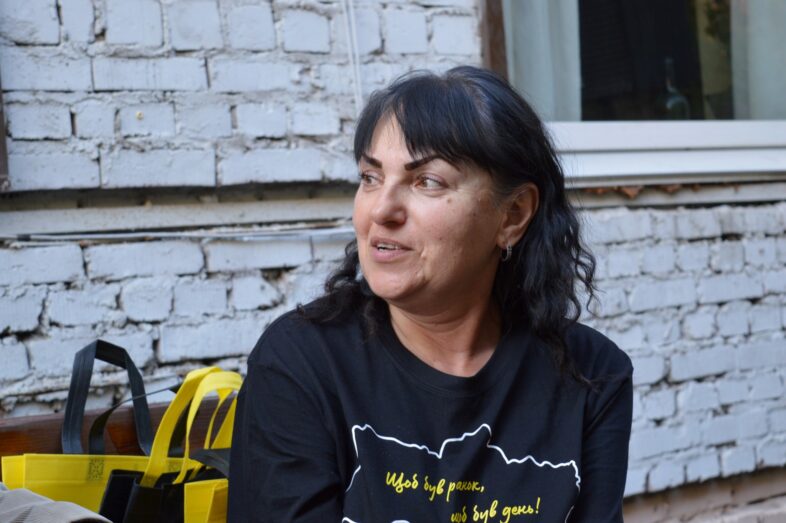
Now, the Ukrainian language is truly a part of me. I wear embroidered shirts not only on national holidays, and Ukrainian traditional dishes have become my absolute favourites. Since 26 February 2022, I’ve been at the Volunteer Coordination Headquarters every day, without a single day off. Seeing me, many people make an effort to respond in Ukrainian—there’s no more mocking or condescending smiles.
For many Ukrainians, Russia’s full-scale invasion was a turning point for language preferences. Ukrainian has come to mean more than just communication; it’s a symbol of resistance and the preservation of national identity.”
Viktor Dmyanenko, an entrepreneur and volunteer from Dnipro, director of Talantam.Com production centre:
“I began to gradually transition to Ukrainian even before the full-scale war, particularly as quotas for Ukrainian-language content in the media started to increase. However, this shift was mostly related to work; in everyday life, Russian still dominated. At that time, society wasn’t raising these issues much, and there wasn’t widespread disdain for everything Russian. I adapted to my surroundings, using more Ukrainian in the western and central parts of the country, while at home in the east, it was less common.
I didn’t face significant challenges in switching languages. The only discomfort came from being in a Russian-speaking environment, which was somewhat limited. I see my small circle of communication as a challenge, but over time, most of my friends have also switched to Ukrainian.
Now, after reassessing my values, I’ve come to see language as a fundamental aspect of personal identity. If I identify as Ukrainian, why should I continue to speak Russian? In truth, anything associated with Russian culture now evokes a deep sense of disgust within me.
Do I feel the need to defend my choice? Not at all. I’m simply happy to see more and more Ukrainian being spoken around me. I’ve chosen to limit my communication with those who still cling to the past.
The paradox of condescension or mockery towards “Ukrainian speakers” is still very much alive. I often notice the distrustful glances and biased attitudes from people who either dismiss it as laziness or feel it’s not the right time to use our country’s language, whether in shops or cafés. The biases fall into a few main categories: the “Oh, come on, we’re used to speaking Russian anyway,” or “It’s great, but it’s just too hard for us,” and “Better to speak Russian than to butcher Ukrainian.
I vividly remember 2014, when Ukrainian-speaking friends and acquaintances started to appear around me month after month. Over the past ten years, they’ve not only achieved near-perfect fluency but have also greatly expanded their vocabulary. One of my friends, an Azerbaijani military photographer who has travelled to dozens of countries, is now a Ukrainian volunteer veteran. He’s been learning the language for several years and shares culinary posts on Facebook exclusively in Ukrainian, even if he sometimes mixes up the cases.
I still think of Olga (Helga) from Russia, who became a Ukrainian defender, and I recall our last correspondence in Ukrainian before her death. I also remember the foreign journalists and volunteers who spoke to us in hesitant, broken Ukrainian back in 2022.
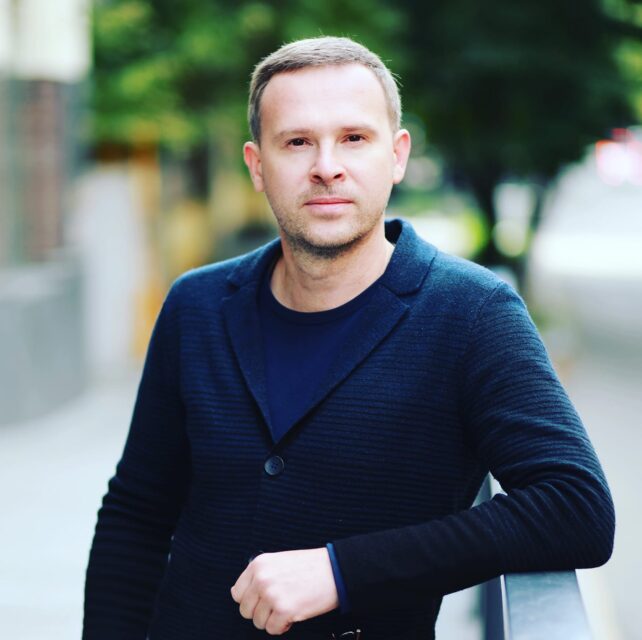 So, why has the transition been so challenging for us since 2014? What sparked this surge of interest in 2022? In 2014, it didn’t feel urgent or terrifying. Missiles weren’t raining down on hospitals and kindergartens across the country. Now, even those rooted in the “Soviet Paleolithic” culture understand that we are not truly brothers with the Russians. They don’t love or tolerate us, especially after the horrors of rape, torture, and the deaths of our prisoners of war.
So, why has the transition been so challenging for us since 2014? What sparked this surge of interest in 2022? In 2014, it didn’t feel urgent or terrifying. Missiles weren’t raining down on hospitals and kindergartens across the country. Now, even those rooted in the “Soviet Paleolithic” culture understand that we are not truly brothers with the Russians. They don’t love or tolerate us, especially after the horrors of rape, torture, and the deaths of our prisoners of war.
In response to the growing demand for knowledge of the Ukrainian language—something that feels very market-driven—numerous courses and educational initiatives have emerged across Ukraine, particularly in cities like Dnipro. For instance, the Yedyni movement offers both online and offline classes for those wanting to switch to Ukrainian. Additionally, there’s the Nareshti project, which is an online conversation club for practising Ukrainian.
In Dnipro, there are initiatives for free language learning organized by local volunteers and cultural centres. For example, there are courses at the Central City Library. Thanks to such initiatives, thousands of people have already improved their language skills and transitioned to using Ukrainian in their daily lives.
DUM (Volunteers of the Ukrainian Language) is an initiative spearheaded by Nataliya Heyman, a philologist, poet, and dedicated activist. Under her leadership, hundreds of people have come together at the veteran-owned pizzeria, First Wave.”
Natalka Heyman, founder of DUM (Volunteers of the Ukrainian Language):
“The language issue is an intrinsic part of our lives, shaped by historical and political circumstances that have often allowed the language of occupiers to dominate in various regions. However, significant events in 2014 and 2022, along with earlier moments like the Orange Revolution in 2004, ignited a renewed sense of national consciousness and fostered the growth of the Ukrainian language. Since the beginning of the full-scale invasion, the Ukrainian language has emerged in many areas as a form of armour—a source of confidence and reassurance that resonates deeply with those around us.
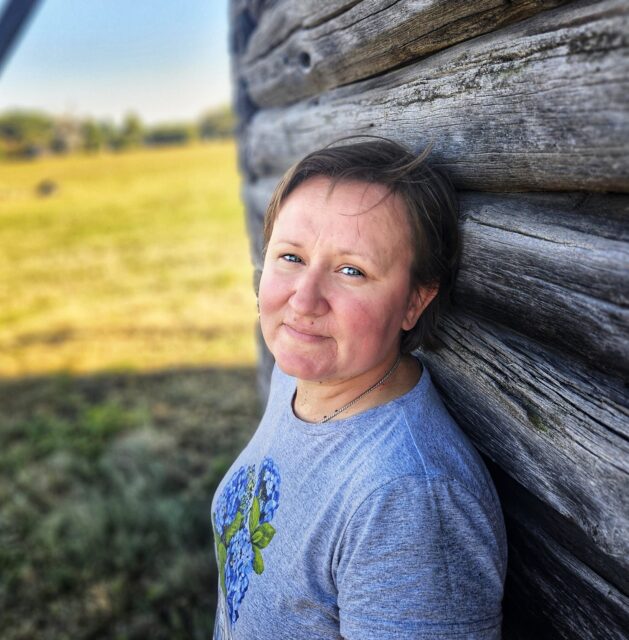
In March of this year, my friends and I were strolling through Dnipro, animatedly discussing Stus, Skovoroda, and the significance of our language. A woman approached us, tearfully expressing her gratitude for speaking Ukrainian. She shared how hearing her native language made her feel at home in her city. What struck me most was her heartfelt declaration: “If only we could ensure that there is never a return to the Russian language. I wish we could truly preserve our national identity.”
It’s disheartening to acknowledge that the Russian language still holds considerable sway—not just in Dnipro but also in Lviv, Kyiv, and Vinnytsia. Yet, amidst the flood of Russian words, Ukrainian can still be heard, ringing out with clarity.
Today, the Ukrainian language serves as our thread of Ariadne, weaving connections between us and strengthening our sense of unity.”
Viktoriia Slavinska, a web developer and songwriter, shares:
“Before the invasion, I didn’t switch to Ukrainian because I grew up in a Russian-speaking family and environment. I have always loved the Ukrainian language, but there were no opportunities or reasons to use it.
I learned the language in school, so it remained in passive use. Following the full-scale invasion, I struggled to switch to Ukrainian for two months due to the stress. However, I eventually began using it actively. Now, I communicate in Ukrainian daily, have changed all my devices to the language, and manage my social media accounts in Ukrainian. Of course, I still slip into Russianisms, but I’m learning by speaking, correcting my mistakes, and singing in Ukrainian while also reading and listening to others.
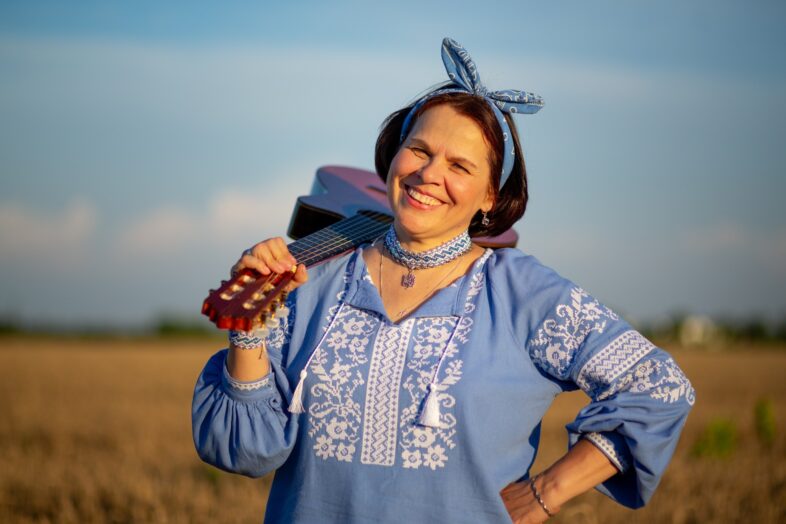
Since making the switch, the language has become a source of protection and support for me, filling me with joy.
To preserve and enhance my language skills, I write songs inspired by the works of Ukrainian poets, delve into history, read in Ukrainian, and share intriguing and informative materials about Ukraine’s history, culture, and literature. I also sing in Ukrainian at concerts abroad.
It may seem straightforward to switch to your native language, but it’s not that simple. Speaking occasionally is one thing; greeting the bread seller daily or surprising colleagues and friends is quite another.
My husband decided to make the switch for the sake of our son. He never learned the language as I did. So, I often feel ashamed that, after writing a paper in eighth grade comparing the works of Hugo and Shevchenko, I let the language slip away for decades.”
Lina Strelnikova, head of the sales department:
“Previously, I didn’t feel a connection to my history. Growing up in my surroundings, I wasn’t taught to respect the language; it was regarded as something foreign.
As a family, we decided to move to Western Ukraine. After spending time there, engaging with locals, and listening to the stories of grandmothers who had endured oppression throughout their lives, I realised that this wasn’t the future I wanted for my children. Regardless of what lies ahead, wherever they may go, I want them to remember their language and cherish their history and traditions, at least through my own transformation.
That’s when I made the decision to communicate exclusively in Ukrainian. It was a daunting challenge, especially since I found myself back in a Russian-speaking environment at home, where judgment often overshadowed acceptance of this choice.
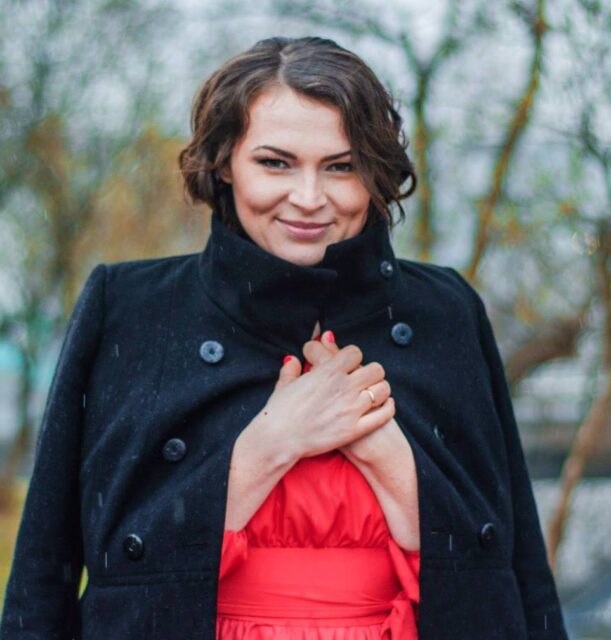
Currently, I am the only one in my family and almost the only one at work who has switched to the Ukrainian language. How did I learn the language? Through books, using all applications in Ukrainian, correspondence, films, and entertainment content… gradually, we are improving and learning every day.
For me, the language is about identifying myself with something native and close. Before the invasion, I didn’t feel that it was necessary; I thought the language wasn’t important in the context of daily communication.
I defend my choice by communicating in a way that feels comfortable to me, ignoring those who dislike it. I believe that only by identifying myself with my history can I understand that the language belongs to us and that it is something we must preserve despite external circumstances. This important habit can be cultivated by instilling respect for the language in children at home.
Thus, 2022 was the year when rockets actually fell, prompting everyone to return to their identity, which influenced the process of Ukrainisation, albeit in a measured way. However, the trend is indeed encouraging.”
Yevhen, 36 years old, software tester:
“I work as a software tester, and this role has greatly facilitated my transition to Ukrainian. The IT sector here is predominantly pro-Ukrainian and very aware of its cultural significance. I remember a moment back in 2020 during a discussion about language when one of my Ukrainian-speaking colleagues remarked, “Well, Zhenya will definitely switch,” as if he could sense my growing connection to the language.
Looking back, I wish I had made the switch sooner, ideally in the summer of 2022, as it felt like the next logical step after the cultural shift. Following the occupation of Crimea, I started to eliminate any Russian content from my life—music, television shows, stand-up comedy, literature, news sources, and even the language of Wikipedia. Before the full-scale war, I hesitated to switch for fear of losing friends and acquaintances (spoiler alert: that’s exactly what happened). This fear held me back from fully embracing my native language.
I transitioned quickly, but it happened in several stages, and along the way, I faced two main challenges: an insufficient vocabulary and limited speaking practice. In critical situations, I would sometimes slip back into Russian and let out a few choice words in that language. Thankfully, I had plenty of resources to support my shift—Ukrainian YouTube channels, film translations, quality music, and a wealth of patriotic events throughout 2022 that I was eager to participate in. Plus, my wife made the switch several months before I did.
Even before the full-scale invasion, there was a significant amount of Ukrainian content around me; I just hadn’t paid enough attention to it. During my transition, I finally began to notice and appreciate it.
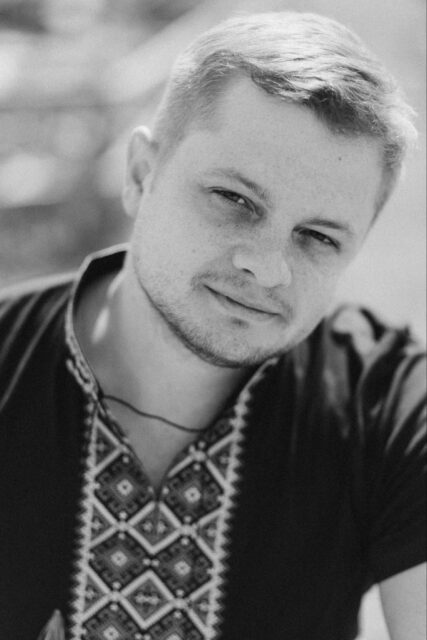
Now, the Russian language has become a defining boundary between “us” and “them,” and its status is only growing stronger. I know this might sound naive or short-sighted, but I’m okay with it. For instance, I wouldn’t trust my mind to a Russian-speaking psychologist, no matter how professional they might be. I subconsciously expect a certain mindset from someone who is fundamentally Russian-speaking—and that tends to hold true. On the bright side, this approach simplifies my life: if content or information is in Russian, I simply don’t need it.
In personal communication, I don’t need to defend my switch to Ukrainian—people either adapt and join me or simply fade out of my life. However, outside of my close circle, I often find myself arguing in shops, cafés, and bars, and I engage in discussions in educational institutions. I explain to my child why this transition matters, and I encourage my friends to explore quality Ukrainian content. Essentially, I challenge people to reconsider their comfortable Russian-speaking lives. Gradually, I feel like I’m becoming the city’s eccentric, the one who mutters and complains—yet deep down, I know I need this change more than anyone else.
It’s also worth mentioning that many Ukrainians who fled the war and have been living abroad have made the switch to Ukrainian as well. For them, it’s a way to signal their Ukrainian identity to the world. Some artists who once confidently spoke Russian have made the choice to embrace Ukrainian almost overnight.”
Maria Hladka, photographer, 31:
“When the full-scale Russian invasion began in 2022, I made the decision to switch to the Ukrainian language. Why hadn’t I done this sooner? Perhaps it was because, until then, Ukrainian felt distant—like running a marathon, giving up sugar, or learning to play the violin: significant but not urgent.
After the first explosion, I felt a profound disdain for everything Russian. Speaking that language became not only uncomfortable but also humiliating, even repulsive. I had an overwhelming urge to distance myself from it.
In that tumultuous first year of the war, the language became my anchor and a passionate pursuit. My friend and I turned it into a game, tossing around new words and asking, “Do you know what this means?” This sparked a boundless exploration of poetry, literature, songs, proverbs, and history.
I made the abrupt decision to switch to Ukrainian in May 2022, choosing to no longer communicate in Russian. While some may find a gradual transition comfortable, I felt disoriented by the “jumps” between languages. The first two weeks were particularly chaotic for my mind, and it took about three months for my thoughts and dreams to fully adapt.
Did I experience the shame that many speak of? No; instead, I felt pride and relief in my choice, even a sense of boldness. The need to defend the Ukrainian language in Ukraine seems almost absurd.
I’m not sure my choice would have been as clear-cut if it weren’t for my daughter. At the time, she was not yet two years old but was already forming complete sentences. I realized that children learn from their parents. Without even discussing identity or heritage, I saw no future in raising my children speaking Russian. What purpose would that serve, and where would that language be relevant? In Ukraine, the Russian language has become a relic of the past.
Unfortunately, finding a Ukrainian-speaking environment for my child remains a challenge, even with the option of private preschools.
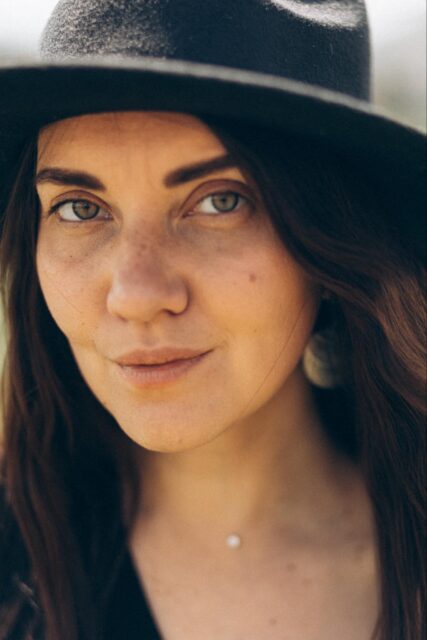
However, I’ve nearly forgotten the difficulties I faced while switching to Ukrainian. The language feels so natural to me now that no one even attempts to sway me otherwise, so I haven’t needed to defend my choice in quite some time. I often hear that I romanticise everything around me, and there’s some truth to that. I engage with life on an emotional level, and Ukrainian art provides immense support. Music, literature, interviews—all of these resonate with me, leaving me with no sentimental ties to the past culture in which I was raised.
I frequently receive compliments and encouragement, ranging from questions like, “Oh, you must be from Lviv?” to heartfelt discussions about the difficulties others face and how they admire my courage. Yet, I don’t see it as courage; perhaps it’s simply a lack of laziness.
Many military personnel, despite being Russian-speaking, are eager to improve their command of Ukrainian. Even those with little time to spare have a deep appreciation for Ukrainian songs and bloggers, explore the country’s history and read works by contemporary Ukrainian authors. A notable group of military writers has emerged, including Olena Gerasymyuk, Yaryna Chornoguz, Valerii Puzyk, Max Kryvtsov, Oleksandr Teren, Pavlo Vyshebaba, Artem Chapai, Oleksandr Mykhed, Sasha Bul, Vitalii Zapeha, and Artem Chekh. These authors not only inspire others to enhance their language skills but also share the belief that Ukrainian defenders embody a kind of superheroism from whom we can learn strength and intelligence.”
Roman Kandybur, a military psychologist who, before his service, served as the head of the Ukrainian School of Playback Theatre; he is also a performer and a public activist:
“There was a time in my life when I was bilingual. However, I never fully transitioned to Ukrainian because I was a ‘fool’—or, as we say at the military, a ‘dumbass’” (he laughs). “I considered myself a patriot, yet I didn’t view the shift away from Russian, a colonial legacy, as urgent. It wasn’t until about six months after February 24 that I made the switch to Ukrainian. This transition coincided with a deep dive into Ukrainian history, ethnogenesis, the influences of steppe peoples, and Cossack culture. I was essentially cleansing myself of Russian narratives. I’m now refining my understanding through Ukrainian-language content—films, music, and language bloggers—and paying attention to orthographic details. An important principle for me is to continue speaking Ukrainian, even when addressed in Russian. I also request that no Russian-language content be played in my presence.
My children now speak Ukrainian and often explain words to me while reading Harry Potter. I believe we should focus not just on defending our language but also on expanding and deepening it. The transition at work posed challenges, especially since I studied psychotherapy in Russian. It can be quite discouraging to face constant corrections; the negativity surrounding language quality is a real hindrance. A kind word can make a significant difference during this transition.
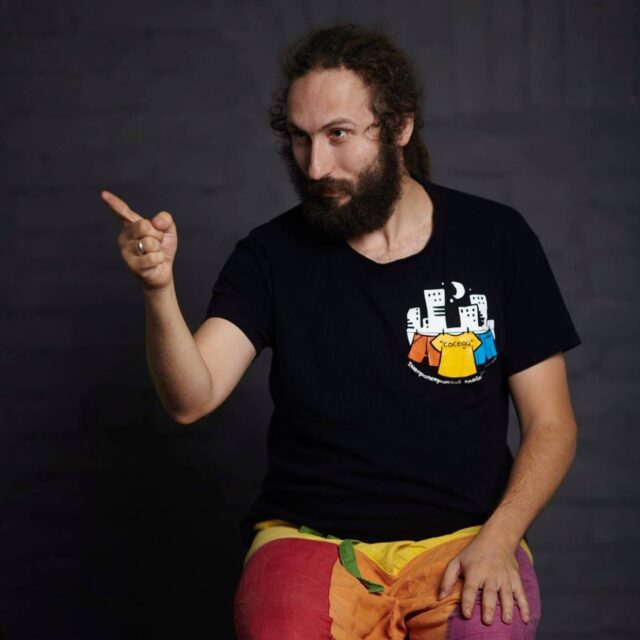
As an ethnic Jew, my ancestral language is Yiddish, which feels increasingly distant. This is why I’m determined to preserve Ukrainian as well; losing it would result in a Russian victory. Currently, I support military defenders as a psychologist, and the Ukrainian language is integral to my identity. Exploring the history and culture of our nation is crucial for forming a new sense of self.
My recipe for success is simple: we must live in the Ukrainian language at every level of life. I advocate for a gentle Ukrainisation, creating new meanings that make Ukrainian appealing both internally and externally.
Hundreds of people have reached out to me on Facebook and through personal messages, offering to contribute to the material. While this is quite a lot for Dnipro, it feels small in the broader context of Ukraine. I’ve received recommendations for various clubs and projects, along with dozens of phone numbers and contacts of individuals who switched to Ukrainian in 2022.
Interestingly, many who have felt overlooked since 2014 have expressed their outrage that I’m not engaging with them. But that’s not the case; I’ve simply had confidence in their journey all along. They’ve been on a mission, reconnecting with their roots. My challenge has been to find those who were inspired to switch languages in the wake of missile strikes. Despite the radical nature of this shift, they managed to make the transition. The key factor here isn’t fear but rather a conscious recognition of their difference from hostile values.
The war has made it really clear that language can be a weapon. For centuries, the Russian language has been used to spread imperial ideas and stifle the national identity of Ukrainians. Unfortunately, the invasion has forced Ukrainians to rethink many aspects of their lives, raising critical questions about our survival as a nation. The issue of language has become one of the biggest challenges we face. Switching to Ukrainian isn’t just about changing how we speak or expressing despair; it’s about choosing to live in a new country, one that is free from foreign history and hostile values.”

